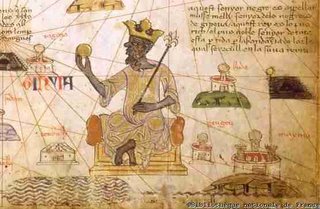
A little digression here to talk about West African history.
I was chatting with a colleague when the subject of ancient West Africa came up. And I was ashamed to learn that I knew too little. I know of the Fulani and Ashanti empires, I know of Uthman Dan Fodio who was a great Islamic scholar and his influence in Northern Nigeria, then there was the slave trade accompanied by inter-tribal wars, there was colonialism, there was the 1914 amalgamation of the Northern and Southern protectorates to create a country called Nigeria - I proudly shared these facts remembered from primary school social studies classes. But was told, "no no, all that's recent, there's history way before that". And of course there should be, but somehow it's history that's overlooked or compressed into the term "pre-colonial times". It certainly did not help that the people of West Africa did not have a form of writing.
Now, allfolktales folks are digging around to learn more about West African history and some interesting bits here:
Mansa Musa
Mansa Musa Mansa Musa was king of the Mali Empire from 1312 - 1337 where the popular Timbuktu was centered. For some reason, it never occurred to me that Timbuktu was in West Africa - and not just a fabled place adventurers spent their lives prospecting for gold.
Mansa Musa is very well known because of his documented hajj to Mecca in 1324. He reportedly travelled with 500 slaves, each carrying a bar of gold. He was so generous to the people he met along the way, giving out gold and treasures that the price of gold in Cairo became depressed for 12 years.
The Mali empire was succeeded by the Shongai empire in the 15th and 16th centuries.
I was chatting with a colleague when the subject of ancient West Africa came up. And I was ashamed to learn that I knew too little. I know of the Fulani and Ashanti empires, I know of Uthman Dan Fodio who was a great Islamic scholar and his influence in Northern Nigeria, then there was the slave trade accompanied by inter-tribal wars, there was colonialism, there was the 1914 amalgamation of the Northern and Southern protectorates to create a country called Nigeria - I proudly shared these facts remembered from primary school social studies classes. But was told, "no no, all that's recent, there's history way before that". And of course there should be, but somehow it's history that's overlooked or compressed into the term "pre-colonial times". It certainly did not help that the people of West Africa did not have a form of writing.
Now, allfolktales folks are digging around to learn more about West African history and some interesting bits here:
Mansa Musa
Mansa Musa Mansa Musa was king of the Mali Empire from 1312 - 1337 where the popular Timbuktu was centered. For some reason, it never occurred to me that Timbuktu was in West Africa - and not just a fabled place adventurers spent their lives prospecting for gold.
Mansa Musa is very well known because of his documented hajj to Mecca in 1324. He reportedly travelled with 500 slaves, each carrying a bar of gold. He was so generous to the people he met along the way, giving out gold and treasures that the price of gold in Cairo became depressed for 12 years.
The Mali empire was succeeded by the Shongai empire in the 15th and 16th centuries.
It is amazing that there could have been so much wealth then and so little now. But maybe that's not entirely surprising, considering how freely the wealth was given away. Mansa Musa reportedly spent all the gold he brought on the trip that he had to borrow money to go back home.
No comments:
Post a Comment